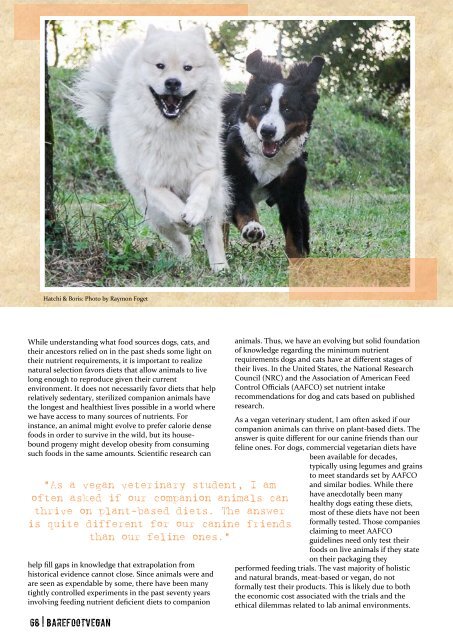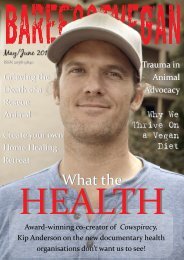barefoot vegan sept_oct issue.pdf
- No tags were found...
Create successful ePaper yourself
Turn your PDF publications into a flip-book with our unique Google optimized e-Paper software.
Hatchi & Boris: Photo by Raymon Foget<br />
While understanding what food sources dogs, cats, and<br />
their ancestors relied on in the past sheds some light on<br />
their nutrient requirements, it is important to realize<br />
natural selection favors diets that allow animals to live<br />
long enough to reproduce given their current<br />
environment. It does not necessarily favor diets that help<br />
relatively sedentary, sterilized companion animals have<br />
the longest and healthiest lives possible in a world where<br />
we have access to many sources of nutrients. For<br />
instance, an animal might evolve to prefer calorie dense<br />
foods in order to survive in the wild, but its housebound<br />
progeny might develop obesity from consuming<br />
such foods in the same amounts. Scientific research can<br />
“As a <strong>vegan</strong> veterinary student, I am<br />
often asked if our companion animals can<br />
thrive on plant-based diets. The answer<br />
is quite different for our canine friends<br />
than our feline ones.”<br />
help fill gaps in knowledge that extrapolation from<br />
historical evidence cannot close. Since animals were and<br />
are seen as expendable by some, there have been many<br />
tightly controlled experiments in the past seventy years<br />
involving feeding nutrient deficient diets to companion<br />
68 | BarefootVegan<br />
animals. Thus, we have an evolving but solid foundation<br />
of knowledge regarding the minimum nutrient<br />
requirements dogs and cats have at different stages of<br />
their lives. In the United States, the National Research<br />
Council (NRC) and the Association of American Feed<br />
Control Officials (AAFCO) set nutrient intake<br />
recommendations for dog and cats based on published<br />
research.<br />
As a <strong>vegan</strong> veterinary student, I am often asked if our<br />
companion animals can thrive on plant-based diets. The<br />
answer is quite different for our canine friends than our<br />
feline ones. For dogs, commercial vegetarian diets have<br />
been available for decades,<br />
typically using legumes and grains<br />
to meet standards set by AAFCO<br />
and similar bodies. While there<br />
have anecdotally been many<br />
healthy dogs eating these diets,<br />
most of these diets have not been<br />
formally tested. Those companies<br />
claiming to meet AAFCO<br />
guidelines need only test their<br />
foods on live animals if they state<br />
on their packaging they<br />
performed feeding trials. The vast majority of holistic<br />
and natural brands, meat-based or <strong>vegan</strong>, do not<br />
formally test their products. This is likely due to both<br />
the economic cost associated with the trials and the<br />
ethical dilemmas related to lab animal environments.





